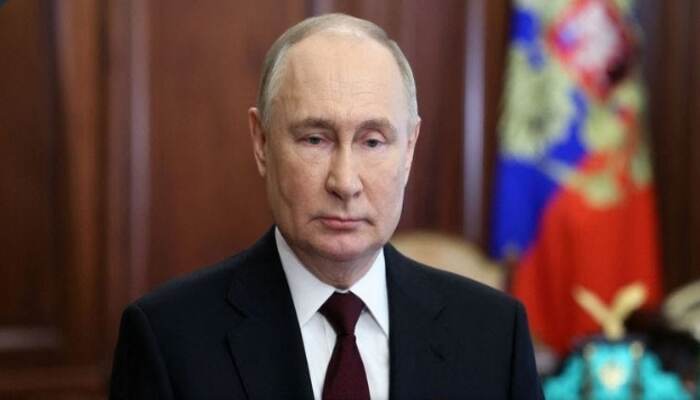
Russian-Ukraine war: Anti-Putin armed groups to attack Russian border cities, after Russian signal jamming on plane carrying Shapps
Kremlin —the war between Russia and Ukraine has reached a critical point with the emergence of a new threat – an anti-Putin armed groups planning to launch attacks on Russian border cities.
There are currently anti-Kremlin armed groups urging civilians to move out of the Russian occupied border regions before a launch of “heavy strikes”.
A source said the anti-Putin armed groups called on local officials to quickly “announce” evictions of civilians from Kursk and Belgorod.
What we have about the Russian signal jamming on plane carrying Shapps:
Skynews reported earlier that Russia jammed the satellite signal on an aircraft used by defence minister Grant Shapps.
Deborah Haynes said in the report that the jet was carrying Mr Shapps back from Poland – he had been visiting a major NATO exercise there.
“It seems as the airspace was flying close to Kaliningrad, which is a piece of Russian territory surrounded by NATO territory, this jamming happened,” stated Deborah.
“Russia is well known for electronic warfare.
“The defence sources are saying there was no danger to the aircraft and the pilots used alternative methods to navigate.
“But it is extraordinary that you’ve got such a high official impacted in this way,” She also said.
Who are the anti-Putin armed groups? And what do they want?
These armed groups of fighters are organised movements that employ armed tactics to challenge the central authority of the Russian government and its policies.
The groups often operate in specific regions, having ethnic or political motivations that drive their resistance against the Kremlin.
What we also have of this report is that the three groups are assumed to be Ukraine-based Russians. A few of them are the Siberian Battalion, Freedom of Russia Legion and Russian Volunteer Corps, which are claiming responsibility for this week’s launch of militia attacks in Russia.
They also claimed to have crossed into Belgorod and Kursk, carrying out battles there. However, Kyiv said these incursions were launched outside of Ukraine’s knowledge.
One of these anti-Putin groups such as the Freedom of Russia Legion is allegedly made up of former Russian national guards and Russian citizens “travelled to Ukraine through third countries”.
Founded in 2022 by a Russian citizen Denis Kapustin, Russian Volunteer Corps comprises Russian citizens devoted to fighting against their own country in favour of Ukraine with self-funded resources.
Back to What they really want? Complexity of the objectives of the anti-Putin armed groups.
These planned strikes, as well as the recent ones they claimed responsibility for, already has sent shockwaves through the region and raised concerns about potential escalation of hostilities and its broader implications for global security.
The separatist movements, anti-Kremlin armed groups, within the Russian Federation appear to only exist to “oppose the policies and authority of the Kremlin”, which is the seat of the Russian government, and often “engage in armed resistance to advance their political, ethnic, or territorial aspirations”.
Meanwhile, as these “disaffected” individuals opposed to Putin’s regime have garnered attention for their bold stance against Russian government and its open defiance of the established order— there are potential consequences.
An attack on Russian soil would undoubtedly provoke a forceful response from the Russian government, leading to a heightened state of conflict and further destabilisation of the region.
Additionally, the impact on civilian populations living in these border cities is a cause for grave concern, with the increased potential for widespread displacement and humanitarian crises.
Historical Context of the Conflict Between Russia and Ukraine, the Cause of the Emerging Anti-Putin Armed Groups and the main anti-Kremlin groups
The rift between countries has been widening since the annexation of Crimea by Russia in 2014, including the subsequent support for separatist movements in eastern Ukraine which have further strained relations between the two countries, leading to the current state of war.
The conflicts have ranged from large-scale rebellions like the Chechen wars to smaller-scale separatist movements in regions such as Chechen Insurgents, Ukrainian Separatists, Ingushetian Oppositio, Tartar Nationalists and Balkar Rebels, and Crimea and Dagestan.
The Balkar population in the Republic of Kabardino-Balkaria has faced historical grievances related to land disputes and cultural rights. Some factions within the Balkar community have resorted to armed resistance to address these issues.
The Russian Government sees them as “terrorist groups” and has often responded with military actions and made counter-terrorism efforts.







